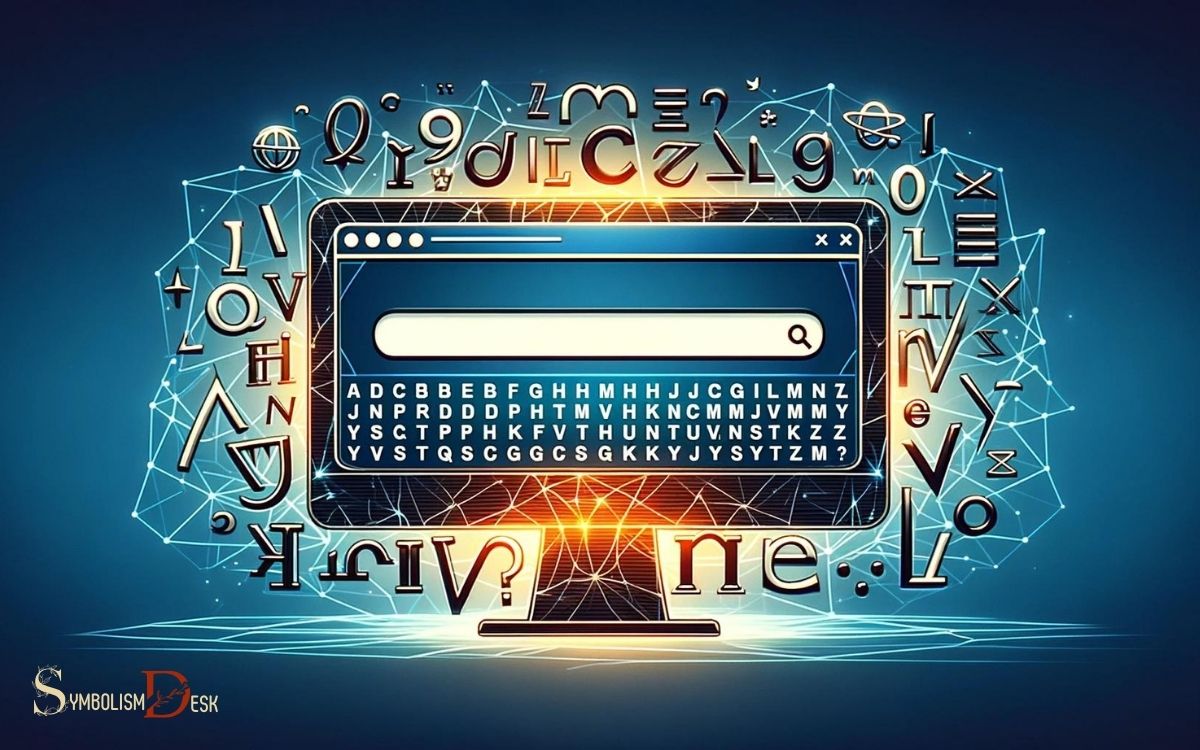Can You Use Symbols in a Domain Name: Hyphens!
No, you cannot use symbols in a domain name. Domain names can only include letters (a-z), numbers (0-9), and hyphens (-). They cannot contain spaces, underscores, or special characters like &,%,$, etc.
Domain names are the addresses used to access websites on the internet, and they have specific rules regarding the characters they can include.
The allowed characters are:
However, there are some restrictions:
These restrictions ensure consistency and prevent confusion when accessing websites. Ensure your domain name is easy to type and remember; avoid symbols that might lead to errors or confusion when users try to find your website online.

Key Takeaway
Legal Restrictions on Symbols in Domains
Legal restrictions on the use of symbols in domain names have been established by various regulatory bodies around the world.
For instance, the Internet Corporation for Assigned Names and Numbers (ICANN) has set guidelines that restrict the use of certain symbols, such as exclamation marks or other special characters, in domain names.
These restrictions are in place to ensure the stability and security of the domain name system, as well as to prevent potential confusion or misuse of symbols in web addresses.
Additionally, some country code top-level domain (ccTLD) registries may have their own specific regulations regarding the use of symbols in domain names.
It is important for individuals and businesses to be aware of these legal restrictions when choosing a domain name to avoid any issues with compliance or potential trademark infringement.
Impact on SEO and Searchability
Restrictions on the use of symbols in domain names can have a significant impact on SEO and searchability, affecting the visibility and accessibility of websites.
Search engine algorithms may have difficulty processing domain names with symbols, potentially leading to lower search rankings and decreased organic traffic.
Additionally, symbols in domain names can make it harder for users to remember and accurately type the URL, further impacting searchability.
To illustrate the impact, consider the following table:
| Aspect | Impact |
|---|---|
| Search Engine Ranking | Symbols may lower a website’s search ranking. |
| Organic Traffic | Decreased visibility may result in lower traffic. |
| User Accessibility | Symbols can make URLs harder for users to type. |
| Brand Recognition | Symbols may hinder brand recall and recognition. |
| URL Memorability | Symbols can reduce the memorability of a domain. |
Understanding these impacts is crucial for making informed decisions about domain names to optimize SEO and searchability.
Technical Limitations and Compatibility
The technical limitations and compatibility of domain names with symbols can pose challenges for website development and functionality. While some symbols, such as hyphens, are allowed in domain names, others may not be universally supported by all web browsers and servers.
This can lead to issues with website accessibility and functionality across different platforms and devices. Additionally, certain symbols may not be compatible with email systems, potentially causing problems with email communication associated with the domain.
It’s important for website developers and owners to consider these technical limitations and compatibility issues when choosing a domain name, as they can impact the overall user experience and the effectiveness of the website.
Prioritizing compatibility and technical feasibility is crucial for ensuring a seamless online presence.
User Experience and Brand Recognition
When it comes to user experience and brand recognition, the impact of symbols in domain names is a crucial consideration. Symbols can affect how users perceive a brand and its website, influencing their trust and engagement.
Understanding the implications of symbol usage in domains is essential for establishing a strong online presence and fostering positive user experiences.
Symbol Impact on Branding
Symbols in a domain name can significantly impact user experience and brand recognition. When used effectively, symbols can convey a message, create visual interest, and enhance brand recall.
However, it is crucial to carefully consider the choice of symbols to ensure that they align with the brand’s identity and values. Memorable and relevant symbols can leave a lasting impression on users, aiding in brand recognition and differentiation in the competitive online space.
Additionally, symbols can influence user perception of a brand, shaping their overall experience and interaction with the website.
Understanding the impact of symbols on branding is essential for creating a cohesive and compelling online presence.
User Perception and Symbols
User perception of symbols in a domain name plays a critical role in shaping their experience and recognition of a brand online.
When users encounter symbols in a domain name, it can influence their initial impression of the brand and affect their overall perception of its credibility and professionalism.
Symbols can convey different meanings and emotions, impacting how users connect with the brand. Additionally, symbols can enhance brand recognition and memorability if used effectively.
However, it is essential for brands to consider the cultural and linguistic implications of symbols, as they may be interpreted differently across various demographics.
Ultimately, user experience and brand recognition are deeply intertwined with the perception of symbols in a domain name, making it crucial for businesses to carefully evaluate their use to ensure a positive impact on their online presence.
Symbol Usage in Domains
The incorporation of symbols in domain names significantly impacts user experience and brand recognition. Symbols can enhance brand recall and make domain names more memorable.
However, excessive or complex symbol usage can also lead to confusion and difficulty in typing the domain name. When used thoughtfully, symbols can convey a brand’s unique identity and set it apart from competitors.
From a user experience perspective, symbols should be easy to interpret and type, ensuring seamless navigation to the intended website. Additionally, symbols should complement the overall brand image and message, resonating with the target audience.
Ultimately, the strategic use of symbols in domain names can contribute to a positive user experience and strengthen brand recognition, but it requires careful consideration of usability and brand alignment.
Considerations for International Domains
When considering international domains, it’s essential to understand the implications of using symbols in domain names and the importance of internationalization.
International domains require careful consideration of language and cultural nuances to ensure user accessibility and brand recognition.
The use of symbols and internationalization in domain names plays a crucial role in reaching global audiences and establishing a strong online presence.
Symbols in Domain Names
Considerations for international domains include the use of symbols in domain names, which can impact the accessibility and usability of websites for a global audience.
When considering the use of symbols in domain names for international websites, it’s important to take into account the potential technical and cultural considerations.
Here are some key factors to consider:
| Consideration | Description | Example |
|---|---|---|
| Technical | Some symbols may not be universally supported by all web browsers and email systems, potentially leading to accessibility issues for users. | $, &, % |
| Cultural | Certain symbols may have different meanings or connotations in various cultures, potentially leading to misunderstandings or unintended associations. | ∞, ☯, ✝ |
| Linguistic | Symbols may not be present in all languages, and their usage could pose challenges for internationalization and localization efforts. | ñ, ç, ø |
Internationalization and Domains
In considering the use of symbols in international domain names, it’s essential to address the implications for global accessibility and usability, particularly in relation to technical, cultural, and linguistic factors.
Internationalized domain names (IDNs) allow for the use of non-ASCII characters, enabling internet users to register domain names in their native languages.
However, this presents technical challenges related to domain resolution and browser support. Cultural considerations are also crucial, as certain symbols may hold different meanings across various cultures.
Furthermore, linguistic factors such as character sets and script direction must be taken into account to ensure proper functionality and user experience.
As such, the internationalization of domain names requires careful attention to technical, cultural, and linguistic nuances to ensure inclusivity and usability on a global scale.
Best Practices for Symbol Usage in Domains
The use of symbols in domain names should adhere to best practices to ensure clarity and accessibility for users. When incorporating symbols into domain names, it is essential to consider the potential impact on user experience and accessibility.
Here are some best practices to follow when using symbols in domain names:
| Best Practice | Description |
|---|---|
| Limit the use of symbols | Overuse of symbols can make a domain name harder to remember and type accurately. |
| Choose universally recognized symbols | Opt for symbols that are widely accepted and understood across different cultures and languages. |
| Avoid ambiguous symbols | Symbols that can be easily confused, such as hyphens and underscores, should be used judiciously. |
| Test for compatibility | Ensure that the domain name with symbols displays and functions correctly across various web browsers and devices. |
| Consider user input methods | Take into account the ease of typing symbols on different keyboards and input devices. |
Conclusion
The use of symbols in domain names can present legal, technical, and user experience challenges. However, with careful consideration and adherence to best practices, symbols can be effectively used to enhance brand recognition and international accessibility. To maximize the benefits of symbols in domain names, businesses must navigate the complexities of symbols in business naming rules, which can vary by jurisdiction. This requires thorough research and possibly legal consultation to ensure compliance with local regulations. Additionally, effective marketing strategies should highlight the unique aspects of the brand’s name, making it memorable and easily identifiable across different markets.
By understanding the impact on SEO, searchability, and compatibility, businesses can leverage symbolism to create memorable and impactful domain names.






